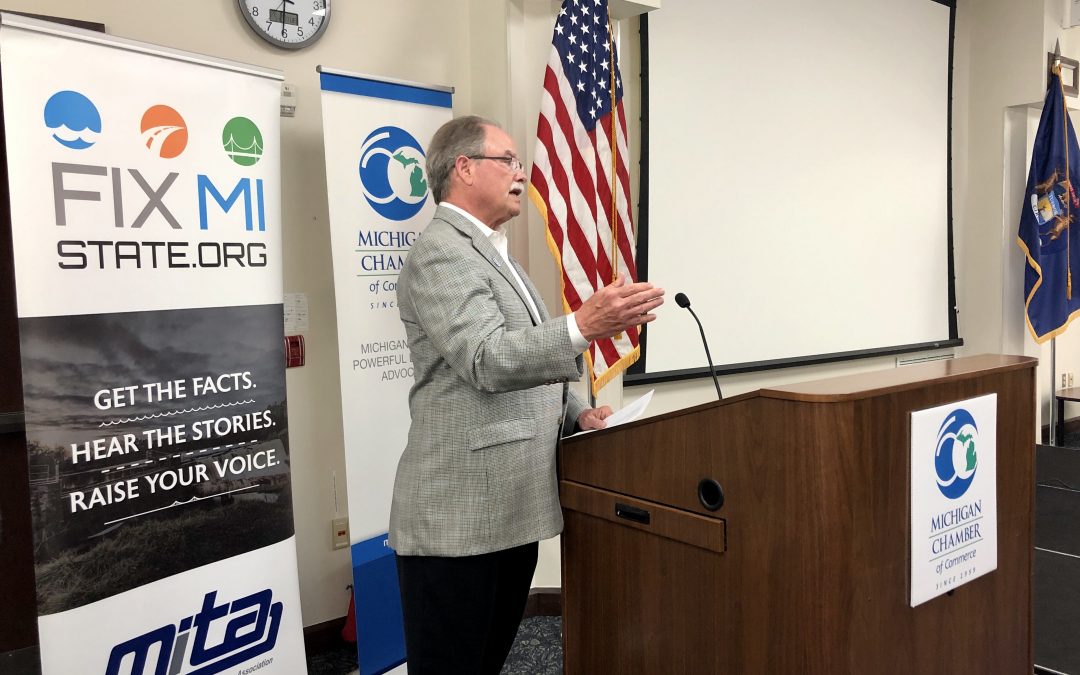As state lawmakers head to Mackinac Island to talk about issues facing Michigan, group leaders call for long-term legislative solutions
LANSING, Mich. — Michigan business and groups representing Michigan’s municipalities urged the Legislature and Gov. Gretchen Whitmer to work together to make fixing Michigan’s infrastructure a priority at a news conference Tuesday at the Michigan Chamber of Commerce. Today marks the first day of the Detroit Chamber’s annual Mackinac Policy Conference that will be attended by state lawmakers. These business and city leaders participating in today’s press conference called for bipartisan solutions to address Michigan’s massive, unmet infrastructure needs.
Aging and failing infrastructure continues to threaten Michigan’s lakes, rivers, drinking water, economy, and public health and safety. Multiple studies demonstrate Michigan will need at least $2.5 billion every year to address the extensive needs.
“Addressing Michigan’s failing infrastructure is essential to strengthening our state’s economic competitiveness,” said Richard K. Studley, President & CEO of the Michigan Chamber of Commerce. “Important industries such as tourism, agriculture and manufacturing all depend on good roads. On behalf of 6,000 Chamber members who employ over 1 million Michiganders across the state, I encourage legislative leaders and Governor Whitmer to work cooperatively to develop long-term solutions that improve Michigan’s roads and bridges in a manner that also treats taxpayers fairly.”
Many studies have quantified the massive problems and desperately needed repairs with Michigan’s aging dams, drinking water systems, roads and bridges, and wastewater and stormwater systems.
The 2019 TRIP report, “Modernizing Michigan’s Transportation System: Progress and Challenges in Providing Safe, Efficient and Well-maintained Roads, Highways and Bridges,” found even with additional transportation funding- which is not guaranteed beginning in 2019 – Michigan’s pavement and bridge conditions will decline.
The Michigan Section of the American Society of Civil Engineers released its 2018 Report Card for Michigan’s Infrastructure, grading 13 categories of the state’s infrastructure, resulting in an overall grade point average of “D+.” The grades ranged from the highest grade of “C+” for Solid Waste to the lowest grade of “D-” for Roads and Stormwater. The 2018 Report Card for Michigan’s Infrastructure found much of the state’s infrastructure is reaching the end of its useful life and continues to threaten Michigan’s lakes, rivers, drinking water, and public health and safety.
“Multiple studies have documented Michigan’s infrastructure repair needs, and we know only legislators working together will create a solution,” said Lance Binoniemi, Vice-President of Government Affairs with Michigan Infrastructure & Transportation Association (MITA). “Pointing fingers does nothing to fix the problem. As our state’s elected leaders head to the Mackinac Policy Conference this week, creating a long-term solution to our state’s infrastructure problem needs to be a top priority.”
Michigan voters ranked fixing infrastructure as their top issue of concern in multiple polls, and Michigan’s cities are also feeling the pain of infrastructure failures.
“Municipalities can’t afford to wait any longer, and are facing tough choices when it comes to fixing our deteriorating infrastructure,” said Dan Gilmartin, CEO and Executive Director of the Michigan Municipal League. “Healthy infrastructure fosters healthy communities and cities to attract talent and thrive economically. We need bipartisanship on this issue in order to find comprehensive solutions.”
News conference speakers urged the Legislature to leave Mackinac Island with a commitment to work together on a long-term solution to fixing the state’s infrastructure.
“Michigan’s infrastructure problem belongs to all of us and our elected leaders in Lansing must work together to fix it,” said Tim Daman, president and CEO, Lansing Regional Chamber of Commerce. “Failing to do so will have dramatic consequences for public health and safety, and our economy. It’s time to take action, our communities and businesses depend on it.”
More information about the state’s infrastructure needs can be found at www.FixMIState.org, a website created by the Fix MI State campaign, which is being led by MITA.

